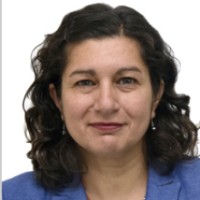Ritu Verma

Adjunct Professor Faculty of Arts and Social Sciences Department of Sociology and Anthropology Clusters: Climate change International affairs Ottawa, Ontario RituVerma@cunet.carleton.ca
Expert In
Languages
French
Bio/Research
Her ethnographic research has been predominantly in the Greater Himalayas and East and Southern Africa, with particular focus on the anthropology of development-political ecology nexus. In the Central Highlands of Madagascar, she examined the various apparatuses of development – conceptual, insti...
Click to Expand >>
Click to Expand >>
Bio/Research
Her ethnographic research has been predominantly in the Greater Himalayas and East and Southern Africa, with particular focus on the anthropology of development-political ecology nexus. In the Central Highlands of Madagascar, she examined the various apparatuses of development – conceptual, institutional, social – that shape agriculture, infrastructure, “women’s” projects, and encounters and life-worlds in Aidland. In Western Kenya, she investigated the effects of hegemonic development policies and practices on gender, land and livelihoods, as well the micro-politics of local responses and resistance.
She has led ground-breaking research projects in Bhutan. One research project focuses on transdisciplinary and ethnographic research on climate change, organic agriculture, holistic food systems, gender and wellbeing in the highlands, in partnership with the College of Natural Resources of the Royal University of Bhutan and the think tank Out of the Box, with funding from Canada’s International Development Research Center. A second ongoing project aims to develop the anthropology of Bhutan and advance anthropology as a discipline, in partnership with the College of Language and Culture Studies of the Royal University of Bhutan, University of California Los Angeles and Out of the Box, with funding from the Wenner Gren Foundation.
Her most recent research, which began over a decade ago, explores development alternatives that challenge GDP-centric frameworks and practices from a degrowth, post-growth wellbeing/happiness and decolonial perspective – with a particular focus on alternative wellbeing alternatives, and Bhutan’s Gross National Happiness. Thework has led her to develop the groundbreaking Beyond Growth Gradient, a framework that assesses wellbeing alternatives for their ability to genuinely move towards holistic alternatives that challenge the current environmentally, socially and culturally destructive neoliberal economic order.
Much of her work straddles the interface of academic and applied anthropology, extending to applied anthropological and activist work that focuses on the climate emergency, moving beyond GDP, and indigenous knowledge and land rights of highland pastoralists - spanning East and Southern Africa, the Himalayas, the Pacific Islands and globally.
Click to Shrink <<
She has led ground-breaking research projects in Bhutan. One research project focuses on transdisciplinary and ethnographic research on climate change, organic agriculture, holistic food systems, gender and wellbeing in the highlands, in partnership with the College of Natural Resources of the Royal University of Bhutan and the think tank Out of the Box, with funding from Canada’s International Development Research Center. A second ongoing project aims to develop the anthropology of Bhutan and advance anthropology as a discipline, in partnership with the College of Language and Culture Studies of the Royal University of Bhutan, University of California Los Angeles and Out of the Box, with funding from the Wenner Gren Foundation.
Her most recent research, which began over a decade ago, explores development alternatives that challenge GDP-centric frameworks and practices from a degrowth, post-growth wellbeing/happiness and decolonial perspective – with a particular focus on alternative wellbeing alternatives, and Bhutan’s Gross National Happiness. Thework has led her to develop the groundbreaking Beyond Growth Gradient, a framework that assesses wellbeing alternatives for their ability to genuinely move towards holistic alternatives that challenge the current environmentally, socially and culturally destructive neoliberal economic order.
Much of her work straddles the interface of academic and applied anthropology, extending to applied anthropological and activist work that focuses on the climate emergency, moving beyond GDP, and indigenous knowledge and land rights of highland pastoralists - spanning East and Southern Africa, the Himalayas, the Pacific Islands and globally.
Click to Shrink <<